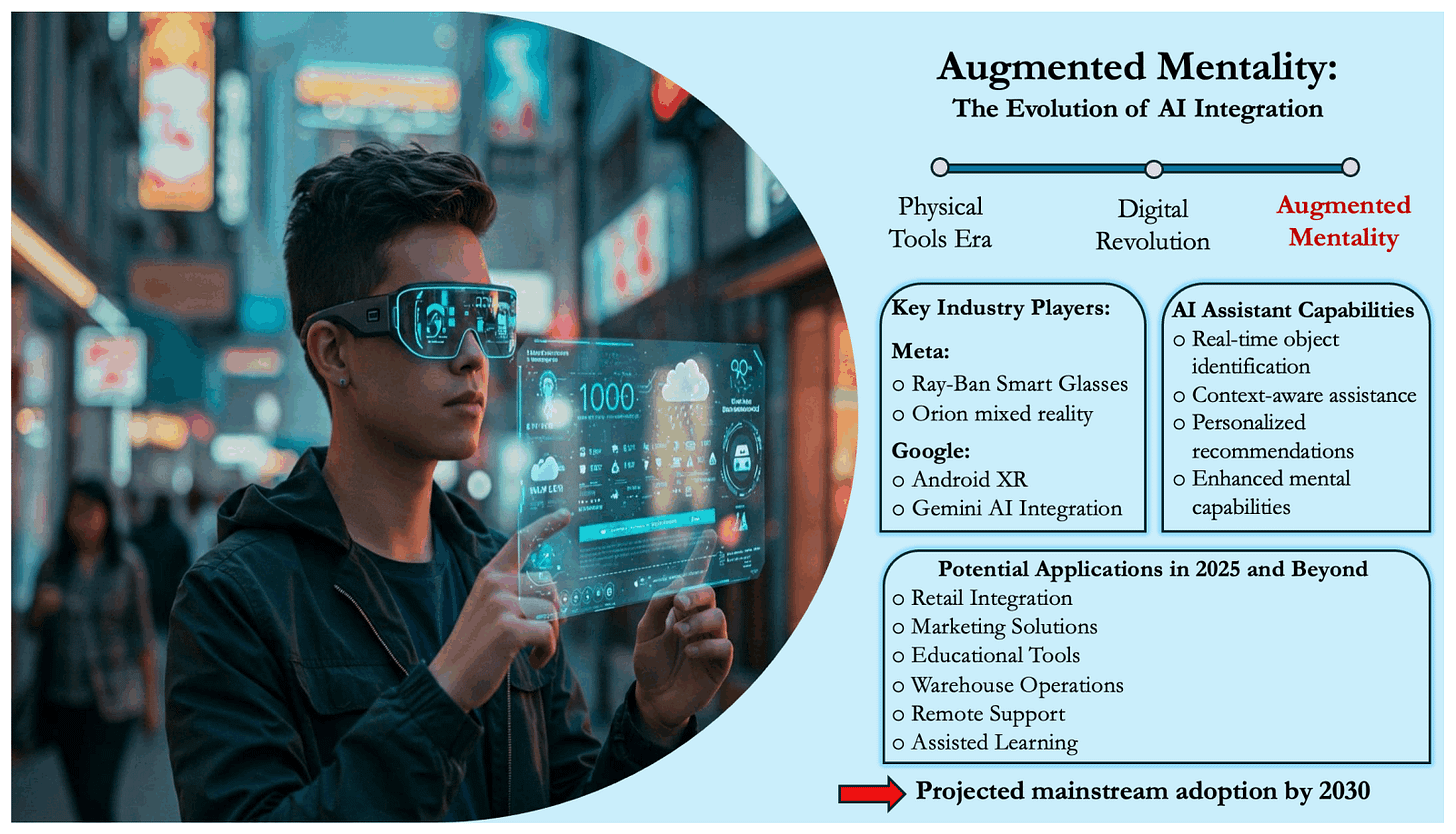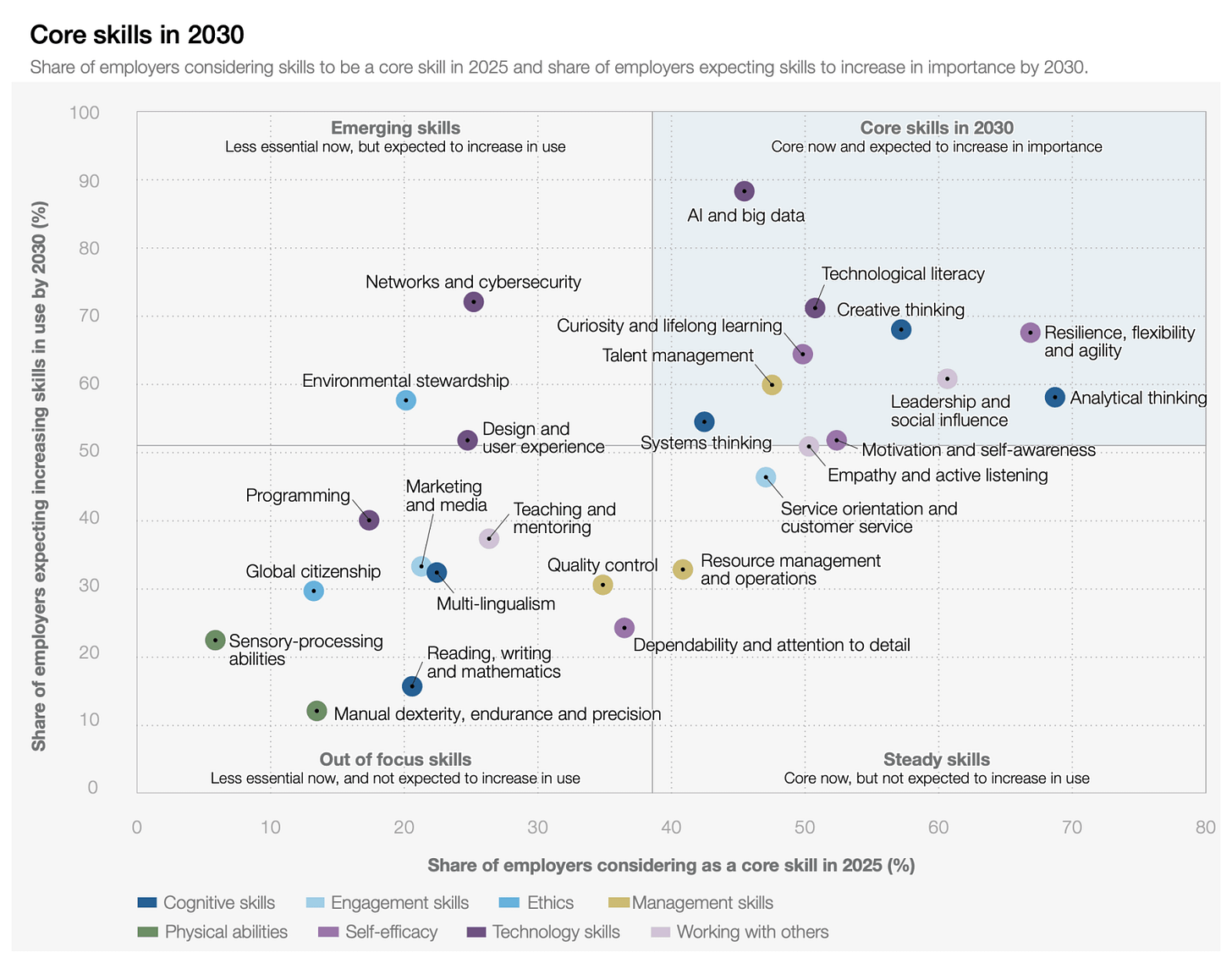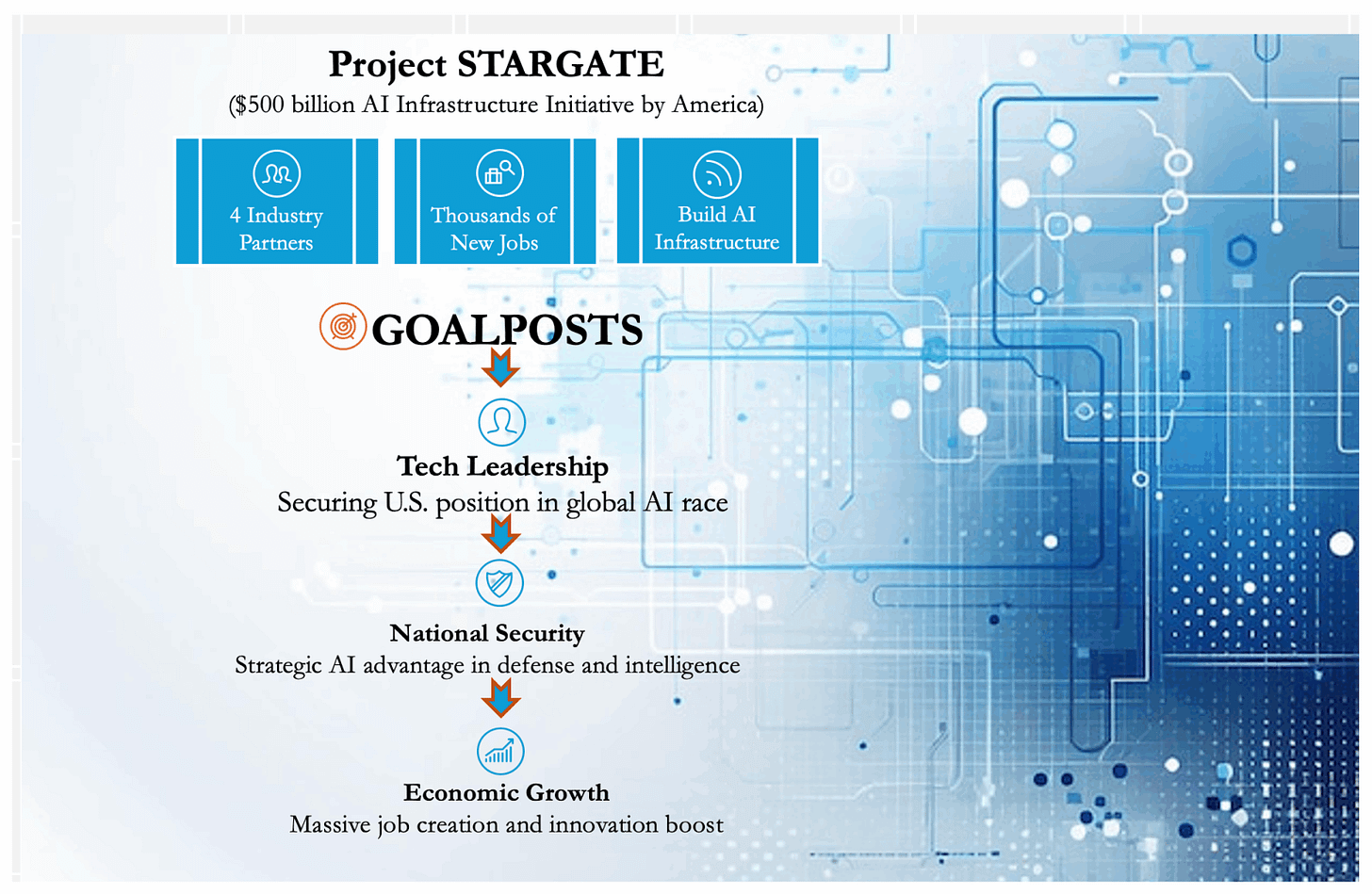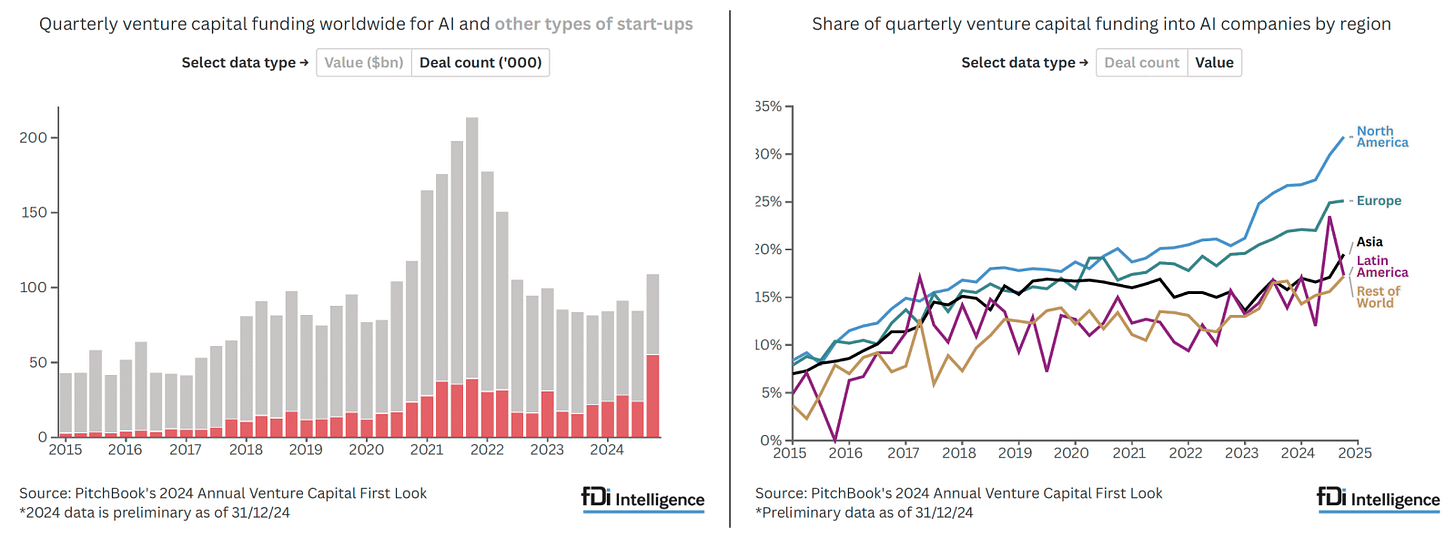Binary Circuit - January 24, 2025
Your weekly guide to most important developments in technological world
Binary Circuit investigates trends, technology, and how organizations might profit from disruption. GreenLight, a global network of disruption consultants and brain behind Binary Circuits, finds possibilities, analyzes challenges, and develops plans to fit and grow firms to stay ahead. Ready for business transformation, looking for partners, or AI/technology integration:
Welcome to Binary Circuits’ 5th weekly edition
This week's must-know developments:
AI Targets Longevity: GPT-4b, a bioengineering AI model aims for longevity through re-engineering Yamanaka proteins.
Augmented Mentality Emerges: AI evolves from being a tool to offering cognitive “abilities.”
Stargate Project Launched: A $500 billion U.S. initiative aims to secure AI leadership and boost economic growth.
Workforce Transformation:AI is set to create millions of jobs by 2030, with skills like creative problem-solving.
Let’s dive in!
AI sets its eyes on extending human lifespan
OpenAI and Retro Biosciences created a protein-generation machine learning model. Scientists have struggled to study protein unfolding. Google DeepMind shocked the world by open-sourcing a database of all proteins for research.
OpenAI’s GPT-4b model is a bioengineering-focused version of GPT-4o created for Retro. The model predicts protein interactions rather than protein structures, unlike DeepMind’s AlphaFold. This protein engineering project initiated last year was supported with $180 million funding.
Retro Biosciences aims to extend human lifespan by 10 years by focusing on Yamanaka factors, a set of proteins that can transform human skin cells into youthful stem cells.
The promise of OpenAI’s GPT-4b
Natural Yamanaka proteins are ineffective at transforming adult cells into stem cells, making these treatments difficult to develop. Retro scientists aim to re-engineer useful Yamanaka proteins using capabilities of Generative-AI.
Retro scientists are targeting two Yamanaka factor proteins, which are crucial to fetal development, using the model. These proteins cause mature adult cells like skin cells to behave like stem cells, according to previous studies.
Preliminary results show promise
These newly modified versions produced 50 times more biomarkers associated with cellular reprogramming in early lab tests. They appear to make stem cells better than natural proteins.
Why does it matter for longevity research?
Reengineered Yamanaka proteins could help in:
Leading to new treatments for conditions such as blindness and diabetes.
Creating functional human organs for transplantation and research.
Generating cells for regenerative medicine and tissue repair.
What’s next?
The two firms will continue research to validate these discoveries and develop new illness treatments. AI is accelerating scientific advancement, which means that the solutions to longevity will become more common.
Tools to ability: A new era begins in 2025
Until now, technology has provided tools that has helped us do more, mostly in physical world. In last two decades, these tools have increased our reach and connectivity with digitization. The undergoing AI revolution is a step change, where the technology will evolve from providing tools to offering cognitive “abilities.”
This new era of technological evolution is deemed as “augmented mentality.”
Wondering what it is?
The fusion of human and artificial intelligence, where AI assistants subtly shape our decisions, interactions, and thoughts. In this context, AI assistants could anticipate our needs, offer real-time counsel, and enhance our mental capabilities.
Future AI assistants will go beyond basic tasks. They will be able to perform tasks like identifying objects, recalling information and drawing actionable insights in real-time, and providing suggestions on diet, travel, business strategies, etc.
AI integration in consumer products, particularly wearable devices, is increasing. Eyeglasses, equipped with sensors, offer a platform for AI-driven context-aware assistance.
Key developments:
Meta’s big stride: Meta initially made an impact by adding context-aware AI to their Ray-Ban glasses and showcasing their Orion mixed reality prototype with remarkable visuals. Meta is leading the wearable gadget market with ambitions to enhance its Ray-Ban smart glasses by 2025.
Google’s response: Android XR, an AI-powered operating system, adds context-aware content to augmented reality. The company has partnered with Samsung to release new eyewear and headsets. Google can challenge Meta with its 70% mobile OS market share and growing AI presence with Gemini.
Many forecasts indicate that by 2030, augmented mentality could become integral to individuals and businesses. Several use cases, especially in retail, marketing, education, and advertising will become possible.
For example: This month, Vuzix Corporation, a leading supplier of smart glasses and Augmented Reality (AR), and its partners displayed a variety of smart glass apps operating on Vuzix smart glasses at the Consumer Electronics Show in Las Vegas. The applications included:
Enhanced warehouse & logistics operations
Increased remote support and guidance
Role in conversational AI & assisted learning
An essential read if you are ready to scale your business. Lessons from ace entrepreneur and investor, Naval Ravikant
Alamanck of Naval Ravikant, a gem for business aspirants, was recommended to me. Naval Ravikant’s almanack is a guide to creating wealth without getting lucky. Every sentence in the book deserves multiple readings. I blogged about the crucial lesson two years ago. I'm thrilled to share this with you all again here.
Some of the key takeaways (by no means are these the only ones), as excerpted from the almanack, are:
Creating wealth is a skill anyone can learn and apply. Wealth is a set of assets that make money while you sleep. Money is how we transfer time and wealth. Get wealthy by giving society what it doesn’t yet know how to get — at scale.
You’re not going to get rich renting out your time. In most cases — renting out your time means you’re replaceable. You must own equity — a piece of a business — to gain your financial freedom.
You don’t get rich by spending your time to save money. You get rich by saving your time to make money.
Arm yourself with specific knowledge, accountability, and leverage.
Specific knowledge is primary for creating wealth. Pursuing your passion and curiosity rather than the latest trend yields specific knowledge. Thus, developing specific knowledge will feel like play to you but labor to others. No specific knowledge can be taught. In this age of unlimited leverage, intellectual curiosity has never been more profitable. If society trains you, it may train someone to replace you. Apprenticeships teach technical or creative skills.
Clear accountability is essential. Without accountability, you lack incentives and credibility. High accountability makes you less replaceable and increases equity. Own your business and take chances. Society rewards responsibility, equity, and leverage. Publicly failing under their names usually gives them power. Nowadays, failure isn't a big deal, so people should take greater responsibility.
A leveraged person can out-produce a non-leveraged one by a factor of one thousand or ten thousand. Business leverage comes from; 1) people (the oldest form, such as labor, meaning people working for you); 2) capital (money, which can be bought and deployed for outsized returns); and 3) products with no marginal cost of replication (such as software code and media including internet, which are permissionless and source of all new wealth).
Productize yourself — Productize = leverage + specific knowledge. Yourself = uniqueness + accountability + specific knowledge. Question yourself — “Is this authentic to me? Is it myself that I am projecting?” And then, “Am I productizing it? Am I scaling it? Am I scaling with labor, capital, code, or media?”
Judgment is the most important skill. Judgment is the exercise of wisdom, which comes from experience. Decisions are crucial because of the leverage of modern technology, large workforces, and capital in the business. Someone who makes decisions right 80 percent of the time instead of 70 percent will be valued and compensated hundreds of times more in the market. You’ll get nonlinear returns if you can be right and rational.
Get comfortable with frequent, small failures. If you’re willing to bleed a little bit every day, but in exchange, you win big later, you’ll do better. The crowd is after the reverse — frequent, small victories (don’t be the crowd).
Escape competition through authenticity. No one can compete with you on being you. When you’re competing with people, it’s because you’re copying them. It’s because you’re trying to do the same thing. But every human is different. Don’t copy!
The secret to peace of mind: You’re competing against yourself — it is a single-player game. Training yourself to be happy is entirely internal. There is no external progress, no external validation.
Future workplaces emphasize human-machine collaboration over job displacement
The labor market is undergoing rapid change as AI continues to develop. The common perception is that AI, especially generative AI with cognitive abilities will replace humans with AI agents. However, like every other technology in the past, we believe, AI will also create more jobs than it replaces in the long term.
The World Economic Forum’s Future of Jobs Report 2025 finds that AI could create 170 million new jobs globally while eliminating 92 million positions, resulting in a net increase of 78 million jobs by 2030.
What does this mean for workforce planning?
Traditional employment strategies that rely primarily on degrees are becoming obsolete.With 50% of employers already intending to reorient their businesses in response to AI, it is evident that adaptation is no longer an option. To remain competitive, it is critical to determine the most valuable skill sets.
Creative thinking: AI excels at processing data and drawing insights. With generative AI, the newer models have displayed human like abilities to perform complex calculations and visual effects. However, it lacks critical thinking terms of the context of the project. The World Economic Forum forecast that many of new jobs will require creative problem-solving skills.
Action for Businesses: Encouraging a culture of innovation is key. In a recent example, 3M encouraged employees to spend time on innovative ideas, which led to Post-it Notes.
Curiosity and lifelong learning: The ability to learn new skills quickly, known as meta-learning, is crucial in today's rapidly changing job market.
Action for Businesses: Companies can help employees with continuing education. Amazon's Career Choice Program pays for high-demand courses for employees.
Emotional agility: As per Capgemini, organizations that invest in emotional quotient (EQ) training see improved team performance and higher job satisfaction.
Action for Businesses: Team collaboration and leadership can improve with EQ training. Capgemini's emotional intelligence coaching program boosts productivity and reduces attrition.
“Stargate” - A $500 billion AI infrastructure push to ensure U.S. competitiveness
President Donald Trump announced on January 21, 2025 the start of the massive $500 billion joint venture Stargate Project, meant to transform artificial intelligence (AI) infrastructure in the U.S. Under the project, OpenAI, SoftBank, Oracle, and MGX are collaborating to build cutting-edge data centers for AI technology.
Stargate focuses on establishing cutting-edge AI infrastructure to boost innovation, jobs, and the economy.
Why is it so essential?
AI Race: Stargate represents a bold step toward safeguarding American leadership in the fast developing field of AI.
Economic Growth: Technology will boost economic growth and create hundreds of thousands of jobs.
National security: Stargate uses AI for intelligence and defense to gain a strategic advantage.
Implications for technology and businesses:
The influence of Stargate will knock on several spheres:
Accelerated AI Development: The initiative will give researchers and developers hitherto unheard-of tools, hence enabling AI capability breakthroughs.
New Business Opportunities: AI will enable industry-wide new products, services, and business models.
Rising AI Adoption: By companies trying to get a competitive edge, Stargate will probably help to push more acceptance of AI solutions.
As we embark on this huge exertion, corporate leaders must be prepared to play the long game. Successful people understand when to walk away and when to stay the course.
Strategy for Success
Ensure Data Integrity
Foster AI Literacy
Strengthen Cybersecurity
Attract and Retain Top Talent
Embed Responsible AI Practices
Chart of the week: AI continues to attract capital!
Investors are going all-in, pouring billions into AI-focused companies. The numbers are staggering:
50.8% of the global VC funding flowed to AI businesses in Q4 2024, almost double the share from 2023.
AI accounts for 25.9% of deals, up from 21.4% in Q4 2023.
According to early PitchBook data, global VC funding for AI start-ups grew 52% to $131.5bn in 2024, while other start-ups declined 10% to $237bn.
Soundbites you must know:
State of the AI report finds that over a quarter of the businesses evaluated haver deployed AI while 14% are in beta testing and 21% are building proof of concepts.
Netflix's new AI model, Go-with-the-Flow, enables you make videos by creating basic paths for objects to follow. Watch a demo of one of its kind AI program.
Morgan Stanley Research identifies four key megatrends shaping 2025’s investment landscape: global commerce rewiring, longevity’s impact, shifting energy priorities, and AI evolution, especially agentic AI.
Google quietly released Gemini 2.0 Flash Thinking, an AI model that explains its reasoning process, a crucial step in increasing transparency and building trust.
Thanks for reading!
Cheers,
Team Binary Circuit







